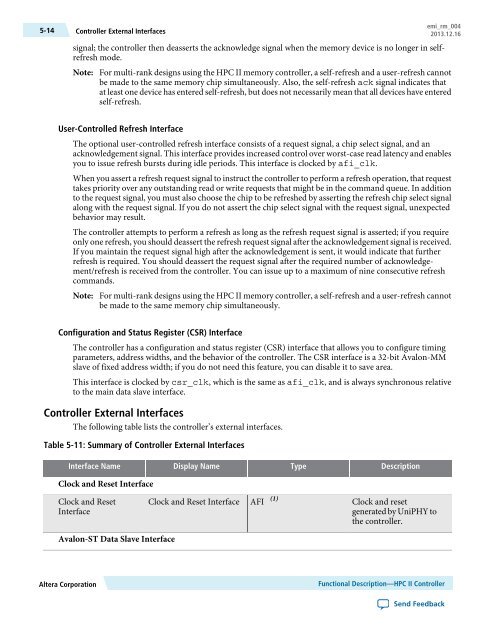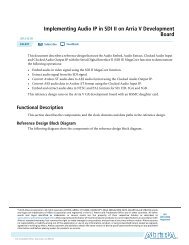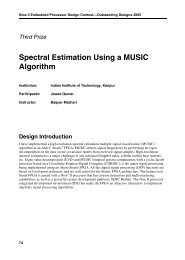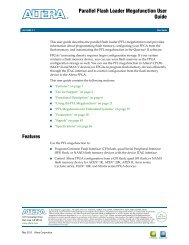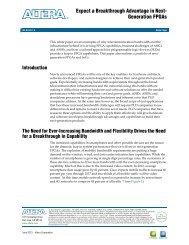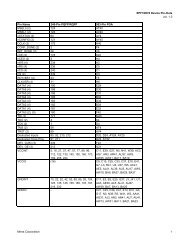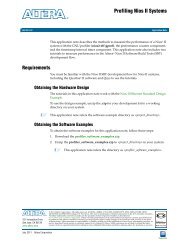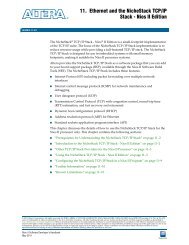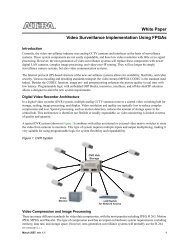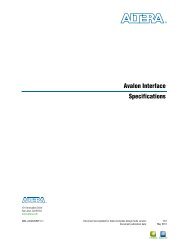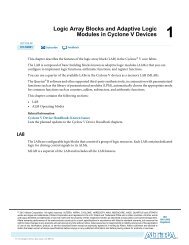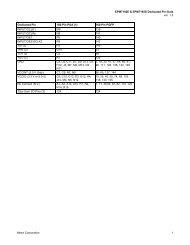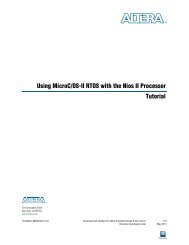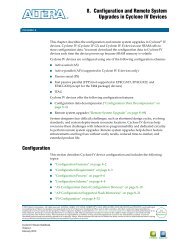Functional Description -- HPC II Controller, External Memory ... - Altera
Functional Description -- HPC II Controller, External Memory ... - Altera
Functional Description -- HPC II Controller, External Memory ... - Altera
You also want an ePaper? Increase the reach of your titles
YUMPU automatically turns print PDFs into web optimized ePapers that Google loves.
5-14<br />
<strong>Controller</strong> <strong>External</strong> Interfaces<br />
emi_rm_004<br />
2013.12.16<br />
signal; the controller then deasserts the acknowledge signal when the memory device is no longer in selfrefresh<br />
mode.<br />
Note: For multi-rank designs using the <strong>HPC</strong> <strong>II</strong> memory controller, a self-refresh and a user-refresh cannot<br />
be made to the same memory chip simultaneously. Also, the self-refresh ack signal indicates that<br />
at least one device has entered self-refresh, but does not necessarily mean that all devices have entered<br />
self-refresh.<br />
User-Controlled Refresh Interface<br />
The optional user-controlled refresh interface consists of a request signal, a chip select signal, and an<br />
acknowledgement signal. This interface provides increased control over worst-case read latency and enables<br />
you to issue refresh bursts during idle periods. This interface is clocked by afi_clk.<br />
When you assert a refresh request signal to instruct the controller to perform a refresh operation, that request<br />
takes priority over any outstanding read or write requests that might be in the command queue. In addition<br />
to the request signal, you must also choose the chip to be refreshed by asserting the refresh chip select signal<br />
along with the request signal. If you do not assert the chip select signal with the request signal, unexpected<br />
behavior may result.<br />
The controller attempts to perform a refresh as long as the refresh request signal is asserted; if you require<br />
only one refresh, you should deassert the refresh request signal after the acknowledgement signal is received.<br />
If you maintain the request signal high after the acknowledgement is sent, it would indicate that further<br />
refresh is required. You should deassert the request signal after the required number of acknowledgement/refresh<br />
is received from the controller. You can issue up to a maximum of nine consecutive refresh<br />
commands.<br />
Note:<br />
For multi-rank designs using the <strong>HPC</strong> <strong>II</strong> memory controller, a self-refresh and a user-refresh cannot<br />
be made to the same memory chip simultaneously.<br />
Configuration and Status Register (CSR) Interface<br />
The controller has a configuration and status register (CSR) interface that allows you to configure timing<br />
parameters, address widths, and the behavior of the controller. The CSR interface is a 32-bit Avalon-MM<br />
slave of fixed address width; if you do not need this feature, you can disable it to save area.<br />
This interface is clocked by csr_clk, which is the same as afi_clk, and is always synchronous relative<br />
to the main data slave interface.<br />
<strong>Controller</strong> <strong>External</strong> Interfaces<br />
The following table lists the controller’s external interfaces.<br />
Table 5-11: Summary of <strong>Controller</strong> <strong>External</strong> Interfaces<br />
Interface Name<br />
Display Name<br />
Type<br />
<strong>Description</strong><br />
Clock and Reset Interface<br />
Clock and Reset<br />
Interface<br />
Clock and Reset Interface<br />
AFI (1)<br />
Clock and reset<br />
generated by UniPHY to<br />
the controller.<br />
Avalon-ST Data Slave Interface<br />
<strong>Altera</strong> Corporation<br />
<strong>Functional</strong> <strong>Description</strong>—<strong>HPC</strong> <strong>II</strong> <strong>Controller</strong><br />
Send Feedback


